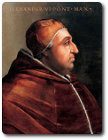Measure for Measure Contents
The Catholic heritage
Papal rule
 At the start of the century England was a Christian country following the practices of the Roman Catholic Church. As today, this was governed by the Pope whose headquarters were in Rome.
At the start of the century England was a Christian country following the practices of the Roman Catholic Church. As today, this was governed by the Pope whose headquarters were in Rome.
The Catholic Church saw itself as having been established by the Apostle Peter, a disciple of Jesus, and all Popes since then have been viewed by Catholics as following in an unbroken line from Peter.
Although the kings of England were supreme rulers within the country in all earthly, or temporal, matters, the Pope had supreme power in England, and in all other Christian states, over matters of the Christian religion.
More on Christendom: Because of its link with Rome, services in the Roman Catholic Church world-wide (an area known as Christendom) were always held in Latin, the language of the Romans. A Christian traveller could go anywhere within Christendom and hear the same service. Latin had become the international language:
- The language of religion in Europe, and therefore,
- The language of scholarship.
Name originally given to disciples of Jesus by outsiders and gradually adopted by the Early Church.
A worldwide Christian church which traces its origins from Peter, one of the disciples of Jesus. It has a continuous history from earliest Christianity. Its centre is the Vatican Palace, Rome, where the Pope resides.
The supreme governor of the Roman Catholic Church who has his headquarters in Rome, in Vatican City. In certain circumstances, his doctrinal utterances are deemed infallible.
The twelve disciples chosen and commissioned by Jesus to share his mission.
One of the twelve disciples of Jesus, originally called Simon but given the name Cephas by Jesus.
1. Term meaning learner or follower.
2. Used in the New Testament in particularly of the twelve apostles of Jesus.
3. Now applied more generally to all Christians.
The name given to the man believed by Christians to be the Son of God. Also given the title Christ, meaning 'anointed one' or Messiah. His life is recorded most fully in the Four Gospels.
Literally, operating within time, and hence earthly and mortal, as opposed to spiritual.
A collective name for countries primarily inhabited by those who accept the Christian faith; it is a term which, in medieval and early modern times, was applied largely to Europe.
The language of the ancient Romans which gradually became the language of the part of the Christian Church which owed allegiance to Rome.
Recently Viewed
Scan and go

Scan on your mobile for direct link.